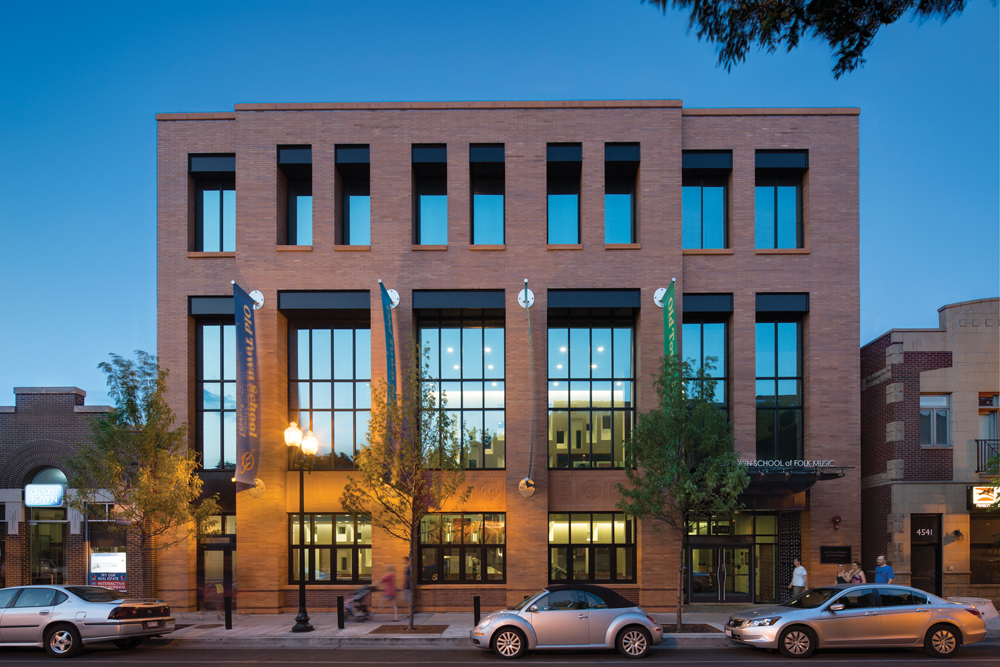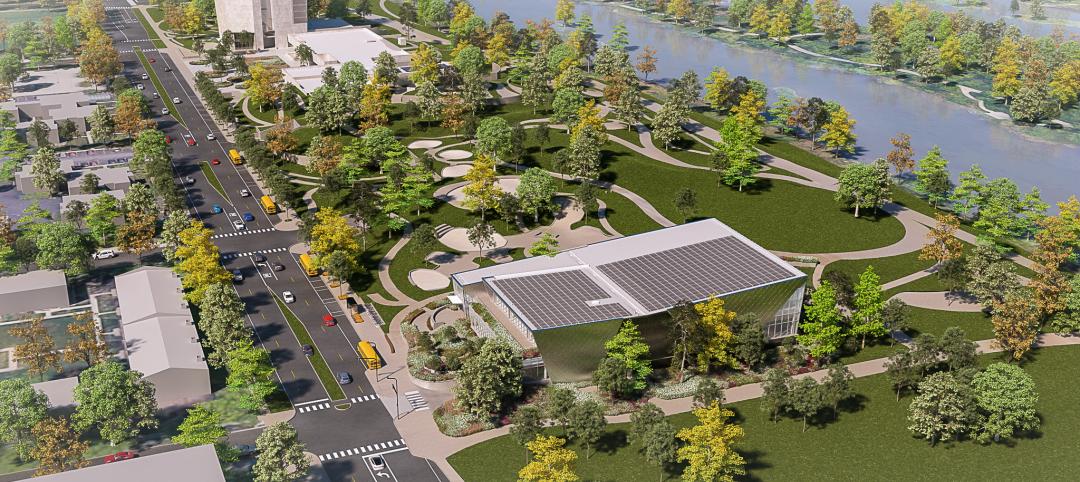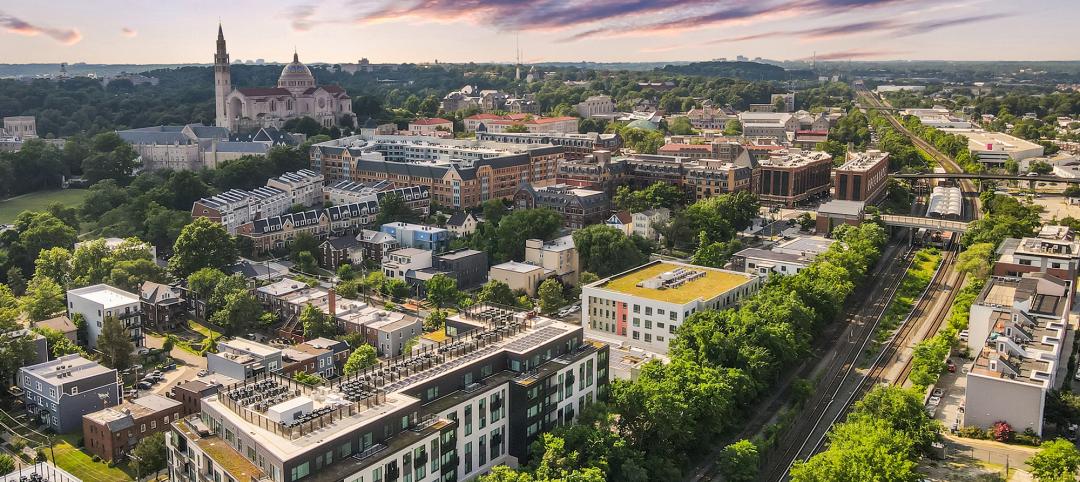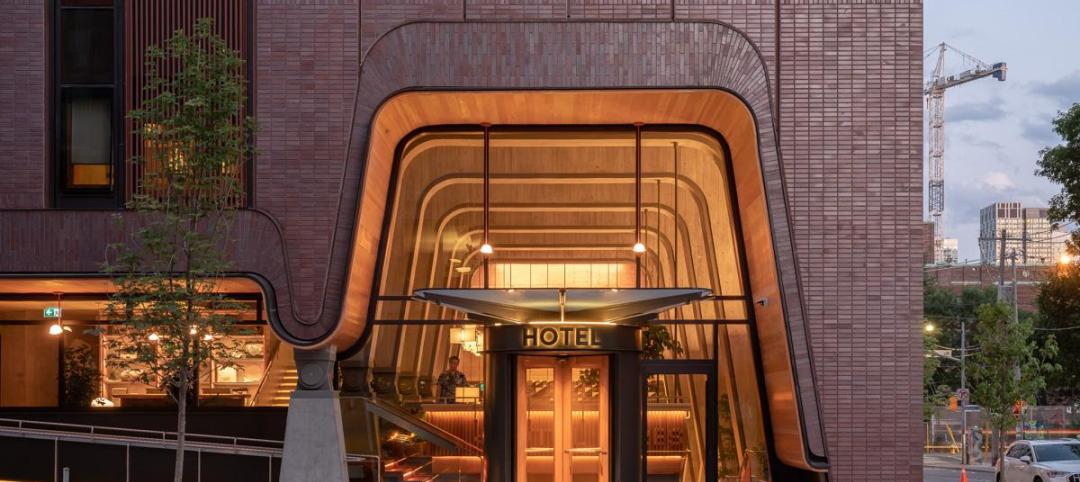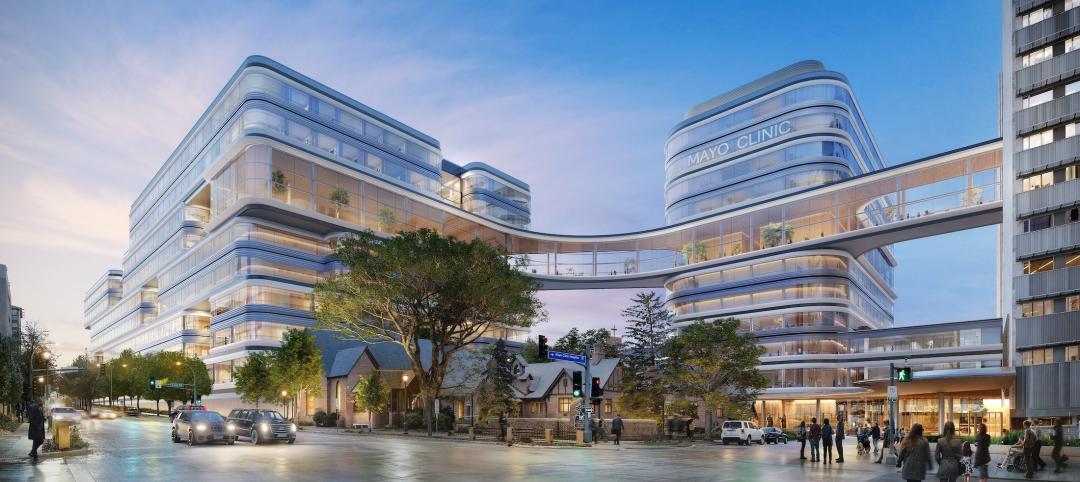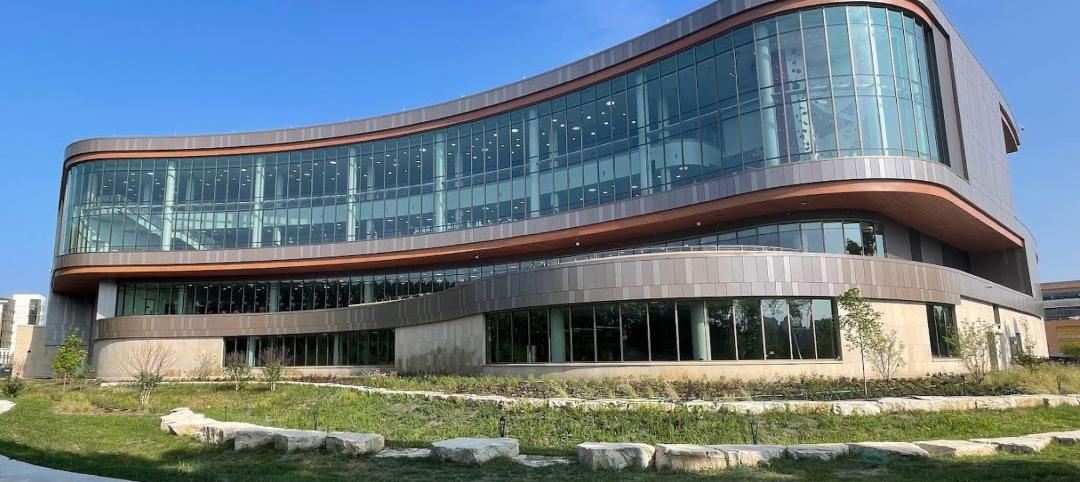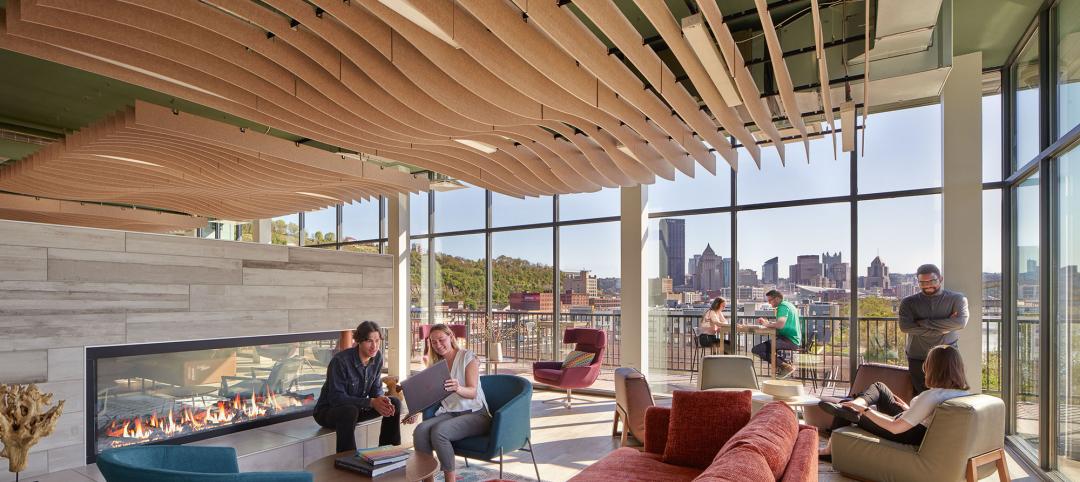Collaboration is fundamental to the mission of the Old Town School of Folk Music. Founded in 1957, the thriving Chicago nonprofit offers multicultural music, dance, theater, and visual arts courses and concerts, with users running the gamut from “Wiggleworm” tots to senior citizens. The school serves about 6,000 students a week, and performances attract 85,000 people annually. Pros often jam with rank beginners, reflecting a spirit of teamwork inspired by the institution’s folk roots.
Despite continuing success, OTS has always operated in reused buildings. Its current facilities include a 19th century banquet hall (renovated in the 1980s) and a 1930s library repurposed as the school’s headquarters in the late 1990s. When the school decided to squeeze its first purpose-built facility into a tight site across the street from its HQ, the Building Team’s collaborative skills proved a good match for the OTS vibe.
The new 28,000-sf East Building includes small spaces for music instruction and practice, a multipurpose hall for performances and parties, three skylit dance studios, and a public “front porch” entry hall. Because room-to-room sound leakage was a longstanding headache, excellent acoustics were a priority.
The open staircase, with stylized portraits of music legends, is the primary feature of the entrance lobby, or “front porch.” The multi-story “feature wall” creates acoustical separation between public areas and the music and dance classrooms, but interior windows maintain a sense of connection and distribute natural light. Soft seating invites informal jam sessions, and the terrazzo floor is studded with recycled beer bottles—a wry nod to the historic connection between music and libations.
The site, on a busy commercial avenue, posed significant issues that became more evident upon further investigation. The water table was high, and any excavation deeper than 11 feet would require tedious permitting through the city’s Office of Underground Construction. The proposed building height, though not unprecedented in the neighborhood, would violate recent zoning language created to prevent development of tall condo buildings.
These factors derailed initial plans to create a four-story facility with a basement. OTS and its architect, VOA Associates, deleted executive offices and storage from the program, resulting in a three-story, no-basement building plus a rooftop mechanical zone. (A return to earlier zoning language was negotiated to address the height restriction, and some of desired building functions were accommodated in a small storefront next to main OTS building.)
Bill Ketcham, AIA, LEED AP, Principal at VOA, says, “We didn’t lose anything that was mission-critical. Through a legitimate budgeting process we managed to maintain quality; I don’t think we were hurt very badly on the value enhancement.”
In addition to owner’s rep The AT Group, acoustical specialist Talaske was an early player. “We knew we needed a highly qualified acoustical consultant from day one, so we didn’t screw that up,” says Ketcham.
Seen from inside a music practice room, the feature wall consists of an inner layer that incorporates fire-rated glazing and fabric-covered acoustical panels, and an outer layer on the public circulation side, which includes glass-fiber-reinforced gypsum frames surrounding the windows. The walls are isolated from each other down to the foundation.
Bulley & Andrews was also hired early, in part because the construction manager had submitted a detailed analysis of how the project could be staged without snarling traffic. “This was quite compelling to us,” says Ketcham. “The building takes up the entire lot, and there’s no parking, so the plan was to frame out the front bay last to allow for staging within the building. Old Town does have a parking lot a couple doors down, and they worked out a plan to use that lot for staging, with the alley available for moving people and materials. Major deliveries were brought in the front during off hours. Lincoln Avenue is pretty congested, but most of the retailers there also do street loading. There was very good coordination with the alderman’s office and the local merchants.”
OTS Executive Director Bau Graves says, “We did community meetings prior to the start, and Bulley & Andrews’ superintendent on the site continually talked with everybody about everything going on. We also offered biweekly tours, and I know most of our neighbors went through at least once, and several more than once, during the construction.”
Notable features of the project include:
• Energy conservation. Operating costs were top-of-mind for OTS, in light of experiences with its headquarters project. The former library, considered sustainable at the time of its renovation with electric heat, had proved costly to operate once the local utility’s promotional rate lock expired. OTS selected natural gas and high-efficiency HVAC for the new LEED Gold building.
• Acoustical design. Robust steel framing and sophisticated isolation technology offer sound control. A full-height “feature wall,” punctuated with recessed slot windows, visually and acoustically separates the music and dance areas from the public lobby.
• Flexible space. Bleachers in Szold Hall, a 2,100-sf room on the second floor, can support 150 seats for concerts but fold back to open the column-free space for dance classes and receptions.
• Contextual design. The front façade echoes the Art Deco library with vertical windows and orange brick. Decorative precast concrete panels feature the word “music” in ancient and modern languages, recalling the library’s decorative terra cotta plaques. Side facades are primarily gray-painted steel: a plain, money-saving treatment that helps downplay the bulk of the building when viewed from the north or south.
Eighteen months after completion, Graves has nothing but praise for those who made the project a reality. “The Bulley & Andrews team, the VOA team, the owner’s rep, all the main players worked through a lot of issues that any job of this scale will represent, and did it with a great deal of tact and forbearance. People told me we’d never want to see our architect again after this kind of job, but we all ended up being good friends.”
Project summary
SILVER AWARD
Old Town School of Folk Music, East Building
Chicago
BUILDING TEAM
Submitting firm: VOA Associates (architect)
Owner: Old Town School of Folk Music
Owner’s rep: The AT Group
Structural: Matrix Engineering
MEP: Primera Engineers Ltd.
Civil: Gary A. Wiss
Acoustical: Talaske
CM: Bulley & Andrews LLC
GENERAL INFORMATION
Project size: 28,070 sf
Construction cost: $13 million
Construction time: Summer 2010 to fall 2012
Delivery method: CM at risk
Related Stories
Industrial Facilities | Apr 9, 2024
Confessions of a cold storage architect
Designing energy-efficient cold storage facilities that keep food safe and look beautiful takes special knowledge.
Cultural Facilities | Apr 8, 2024
Multipurpose sports facility will be first completed building at Obama Presidential Center
When it opens in late 2025, the Home Court will be the first completed space on the Obama Presidential Center campus in Chicago. Located on the southwest corner of the 19.3-acre Obama Presidential Center in Jackson Park, the Home Court will be the largest gathering space on the campus. Renderings recently have been released of the 45,000-sf multipurpose sports facility and events space designed by Moody Nolan.
Green | Apr 8, 2024
LEED v5 released for public comment
The U.S. Green Building Council (USGBC) has opened the first public comment period for the first draft of LEED v5. The new version of the LEED green building rating system will drive deep decarbonization, quality of life improvements, and ecological conservation and restoration, USGBC says.
Codes and Standards | Apr 8, 2024
Boston’s plans to hold back rising seawater stall amid real estate slowdown
Boston has placed significant aspects of its plan to protect the city from rising sea levels on the actions of private developers. Amid a post-Covid commercial development slump, though, efforts to build protective infrastructure have stalled.
Sustainability | Apr 8, 2024
3 sustainable design decisions to make early
In her experience as an architect, Megan Valentine AIA, LEED AP, NCARB, WELL AP, Fitwel, Director of Sustainability, KTGY has found three impactful sustainable design decisions: site selection, massing and orientation, and proper window-to-wall ratios.
Brick and Masonry | Apr 4, 2024
Best in brick buildings: 9 projects take top honors in the Brick in Architecture Awards
The Ace Hotel Toronto, designed by Shim-Sutcliffe Architects, and the TCU Music Center by Bora Architecture & Interiors are among nine "Best in Class" winners and 44 overall winners in the Brick Industry Association's 2023 Brick in Architecture Awards.
Retail Centers | Apr 4, 2024
Retail design trends: Consumers are looking for wellness in where they shop
Consumers are making lifestyle choices with wellness in mind, which ignites in them a feeling of purpose and a sense of motivation. That’s the conclusion that the architecture and design firm MG2 draws from a survey of 1,182 U.S. adult consumers the firm conducted last December about retail design and what consumers want in healthier shopping experiences.
Healthcare Facilities | Apr 3, 2024
Foster + Partners, CannonDesign unveil design for Mayo Clinic campus expansion
A redesign of the Mayo Clinic’s downtown campus in Rochester, Minn., centers around two new clinical high-rise buildings. The two nine-story structures will reach a height of 221 feet, with the potential to expand to 420 feet.
Sports and Recreational Facilities | Apr 2, 2024
How university rec centers are evolving to support wellbeing
In a LinkedIn Live, Recreation & Wellbeing’s Sadat Khan and Abby Diehl joined HOK architect Emily Ostertag to discuss the growing trend to design and program rec centers to support mental wellbeing and holistic health.
Architects | Apr 2, 2024
AE Works announces strategic acquisition of WTW Architects
AE Works, an award-winning building design and consulting firm is excited to announce that WTW Architects, a national leader in higher education design, has joined the firm.


